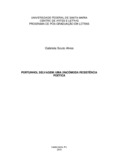| dc.creator | Alves, Gabriela Souto | |
| dc.date.accessioned | 2021-04-09T12:00:50Z | |
| dc.date.available | 2021-04-09T12:00:50Z | |
| dc.date.issued | 2019-10-18 | |
| dc.identifier.uri | http://repositorio.ufsm.br/handle/1/20515 | |
| dc.description.abstract | From the theoretical object of this scientific reflection, which includes the discourse in and on "portunhol selvagem", the theme of this amalgamated language is developed as a possible poetic manifestation of resistance. For this, the research question covers the effects of meaning of the "selvagem" designation and the contradictions that the poetics of this portunhol produces when putting itself as resistance. The main objective is to problematize the self-asserted place of resistance, thinking about the failures and misconceptions constitutive of the discursive functioning in and on "portunhol selvagem". Specific aspects involve exploring the “portunhol selvagem” naming, as well as its subsequent designation, since this gesture involves semantic movements - the designation process - and discursive movements - identification and subjectivation. The delimitation of the analytic object occurs especially around of some statements given by the writer Douglas Diegues, they are cut out of interviews, and the author answers questions about "portunhol selvagem" in "portunhol selvagem", always in written form. Considering the indissociable link between orality, writing and literature as constituting the "portunhol selvagem", a relation of this object is made with the triad ideology-subject-discourse, and the theoretical apparatus of this thesis involves, above all, the materialist theory of discourse, especially as mobilized by Michel Pêcheux in the French Discourse Analysis. The conclusions indicate why this resistance is called (in)convenient, since, from the social, cultural, economic and historical point of view, it is convenient and comfortable for the subject of the "portunhol selvagem" at the same time that it disturbs and challenges traditionally established linguistic, poetic and literary standards. | eng |
| dc.description.sponsorship | Coordenação de Aperfeiçoamento de Pessoal de Nível Superior - CAPES | por |
| dc.language | por | por |
| dc.publisher | Universidade Federal de Santa Maria | por |
| dc.rights | Attribution-NonCommercial-NoDerivatives 4.0 International | * |
| dc.rights.uri | http://creativecommons.org/licenses/by-nc-nd/4.0/ | * |
| dc.subject | Portunhol selvagem | por |
| dc.subject | Resistência | por |
| dc.subject | Análise de discurso | por |
| dc.subject | Modalidades do funcionamento subjetivo | por |
| dc.subject | Resistance | eng |
| dc.subject | Discourse analysis | eng |
| dc.subject | Subjective functioning modalities | eng |
| dc.title | Portunhol selvagem: uma (in)cômoda resistência poética | por |
| dc.title.alternative | “Portunhol selvagem”: an (in)convenient poetic resistance | eng |
| dc.type | Tese | por |
| dc.description.resumo | A partir do objeto teórico cerne desta reflexão científica, o qual compreende o discurso em e sobre portunhol selvagem, é desenvolvida a temática de uma língua amalgamada como possível manifestação poética de resistência. Para tanto, a questão de pesquisa abrange os efeitos de sentido da designação selvagem e as contradições que a poética desse portunhol produz ao se colocar como resistência. O objetivo principal é problematizar o lugar autoafirmado de resistência, pensando nas falhas e equívocos constitutivos do funcionamento discursivo em e sobre portunhol selvagem. Os objetivos específicos envolvem explorar a nomeação portunhol selvagem, bem como sua consequente designação, já que esse gesto envolve movimentos semânticos – o processo de designação – e movimentos discursivos – a identificação e a subjetivação. A delimitação do objeto analítico se dá, especialmente, em torno de algumas declarações dadas pelo escritor Douglas Diegues, elas são recortadas de entrevistas, sendo que o escritor responde a questões sobre o portunhol selvagem em portunhol selvagem, sempre de forma escrita. Considerando o elo indissociável entre oralidade, escrita e literatura como constitutivo do portunhol selvagem, é feita uma relação desse objeto com a tríade sujeito-discurso-ideologia, e o aparato teórico desta tese envolve, sobretudo, a teoria materialista do discurso, especialmente conforme mobilizada por Michel Pêcheux na Análise de Discurso francesa (AD). As conclusões indicam por que essa resistência é considerada (in)cômoda para esta tese, pois, do ponto de vista social, cultural, econômico e histórico, ela se apresenta conveniente e exequível ao sujeito do portunhol selvagem ao mesmo tempo em que perturba e desafia padrões linguísticos, poéticos e literários tradicionalmente estabelecidos. | por |
| dc.contributor.advisor1 | Scherer, Amanda Eloina | |
| dc.contributor.advisor1Lattes | http://lattes.cnpq.br/0683532681929143 | por |
| dc.contributor.referee1 | Glozman, Mara Ruth | |
| dc.contributor.referee2 | Medeiros, Vanise Gomes de | |
| dc.contributor.referee3 | Sofia, Estanislao | |
| dc.contributor.referee4 | Sturza, Eliana Rosa | |
| dc.creator.Lattes | http://lattes.cnpq.br/4937561248606261 | por |
| dc.publisher.country | Brasil | por |
| dc.publisher.department | Letras | por |
| dc.publisher.initials | UFSM | por |
| dc.publisher.program | Programa de Pós-Graduação em Letras | por |
| dc.subject.cnpq | CNPQ::LINGUISTICA, LETRAS E ARTES::LETRAS | por |
| dc.publisher.unidade | Centro de Artes e Letras | por |



